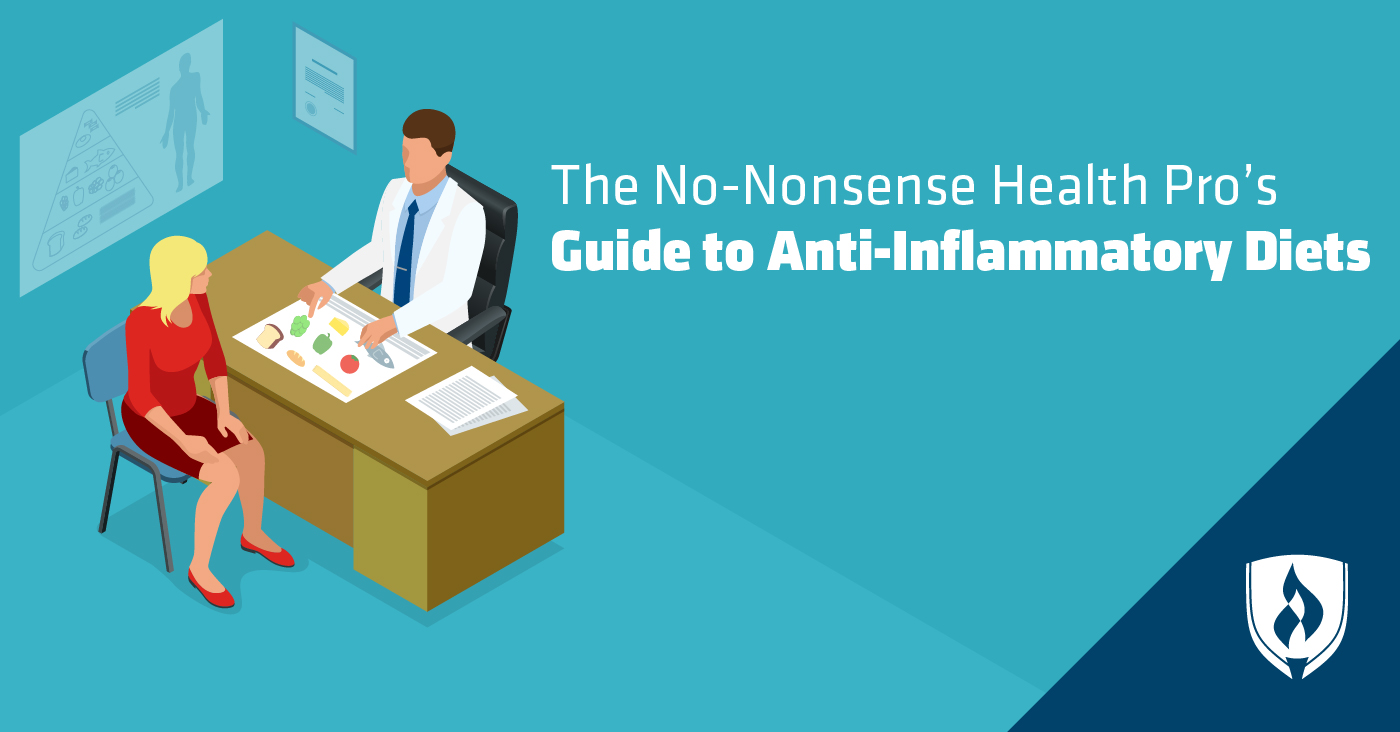
You’ve heard how health issues related to chronic inflammation can wreak havoc on the human body, and have likely wondered whether diet can really be the key to reducing inflammation. You obviously don’t want aches and pains or the chronic conditions and diseases linked with inflammation but how much will an anti-inflammatory diet really help?
Maybe you’ve heard of the benefits of healthy fats like olive oil and avocado or wondered whether having a glass of red wine at dinner is exactly what the doctor ordered. You care about your health and what you eat, but you also don’t want to make any changes unless you know what kind of difference it will make. We dug into the research and interviewed experts to find out what exactly an anti-inflammatory diet is, how it works and whether it helps.
What is inflammation?
Before we get too far along, it’s important to understand what inflammation actually is and why it occurs. Despite the discomfort it can cause, inflammation is a normal bodily healing function. Whenever a foreign substance enters the body, our bodies go into a sort of defense mode. This triggered chemical reaction prepares the body to fight the invading substance—dousing the area with blood, fluid and proteins, creating heat and swelling as protection so the body can heal. Overall, it’s a critical bodily function—the major issues with inflammation only come when our bodies go too far with it.
What causes inflammation in the body?
There are two types of inflammation: acute and chronic. Acute inflammation is temporary and necessary for healing, according to registered dietician nutritionist Lizzie Streit of It’s a Veg World After All. Temporary acute inflammation protects your overall health. When you cut your finger or sprain your ankle, your immune system sends white blood cells to protect the affected area. Immune cells work to repair, dissolve and remove damaged cells. But when low levels of inflammation get triggered and persist even when there’s no threat, the immune cells begin damaging healthy parts of the body. This is chronic inflammation.
What is chronic inflammation?
Chronic inflammation is the type of inflammation that persists despite little to no immediate threat to the body and can have many negative effects on your overall health. This condition may cause bothersome daily symptoms, including:
- Joint pain
- Skin rashes
- Excessive mucus production
- Low energy despite enough sleep
- Bloating
- Abdominal pain
- Constipation
- Loose stool
- Changes in mood or irritability
These day-to-day symptoms may be easy to shrug off if they happen occasionally, but can affect your quality of life as a whole if they’re consistently present. Though acute inflammation is primarily felt in the directly affected area, chronic inflammation may not be felt for a long period of time. These small day-to-day symptoms like fatigue, anxiety and GI issues can be good indicators of chronic inflammation, according to Streit.
What is an anti-inflammatory diet?
Though there is no single, universally recognized “anti-inflammatory diet” the general approach typically includes a balanced diet of fresh foods including colorful fruits and vegetables, whole grains, fish, tea and even dark chocolate and red wine.
“A useful eating plan for avoiding inflammatory food is the Mediterranean diet, which emphasizes vegetables, minimal grains and family connections,” says Dr. Terry Wahls, a clinical professor of medicine at the University of Iowa and anti-inflammatory diet proponent.
Proponents of these diets think they could play a part in combating major illnesses and improving overall health. That’s not without basis—some studies of anti-inflammatory diet variants have shown promising results in the treatment of diseases and conditions like cancer, heart disease and diabetes. It’s important to note that while these studies seem to indicate a positive correlation, it remains a challenge to precisely determine the effects of a specific diet on overall health.
Though these studies come with caveats, an anti-inflammatory or Mediterranean-style diet rich in vegetables, fruit, whole grains and fish can serve as a great blueprint for a healthy lifestyle.
“An overall healthy lifestyle is the best bet for fighting disease and inflammation,” says Amanda Miller, RD, LDN and advisor to Smart Healthy Living.
So what does an anti-inflammatory diet look like? The following foods can all help regulate inflammation:
- Olive oil and olives
- Green leafy vegetables
- Nuts and seeds
- Fatty fish like salmon, mackerel, tuna and sardines
- Herbs and spices (i.e., turmeric, ginger and rosemary)
- Fruits (i.e., strawberries, blueberries, cherries, oranges)
- Whole grains
- Dark chocolate
Though it may be tempting to pick and choose and just focus on adding dark chocolate or olive oil to your day, vegetables will play a key role in any anti-inflammatory diet.
“Veggies are the backbone of a well-balanced diet,” says Streit.
They provide vitamins, minerals, fiber and mostly notably, antioxidants. Antioxidants, such as Vitamins C and E, may help protect cells against the effects of free radicals—which may play a role in heart disease, cancer and other diseases. Even small increases in your vegetable intake can make a difference in reducing your risk for chronic inflammation. Omega-3 fatty acids, another key component of anti-inflammatory diets, are found in fish and certain oils, nuts and seeds; these can also help your body maintain healthy levels of free radicals.
You’re probably wondering—what’s the flip side of this? For those who are hoping to follow an anti-inflammatory diet, avoid the following:
- Fried foods
- Sodas and other sugary beverages
- Refined carbs (i.e., white breads, pastries)
- Margarine or shortening
- Red or processed meats
- Sugar
Dr. Wahls especially recommends keeping a close watch on your sugar intake. “Sugar, in particular, revs up inflammation and feeds gut bacteria that love sugar.” Reading labels is key to limiting added sugar in your diet, but it can be tricky to keep track of the ingredients where added sugar can hide. Keep an eye out for:
- Brown sugar
- Corn sweetener
- Corn syrup
- Fruit juice concentrates
- High-fructose corn syrup
- Honey
- Molasses
- Syrup sugar molecules ending in “-ose” (dextrose, fructose, glucose, lactose, maltose, sucrose)
Is an anti-inflammatory diet right for me?
The short answer? Possibly. Generally speaking, the guidelines for anti-inflammatory or “Mediterranean” diets don’t appear dangerous or overly restrictive. But with any major diet change, your safest bet is to consult with a doctor first to make sure you’re not putting yourself at risk.
Obviously, this diet is worth exploring if you suffer from chronic inflammation, but it could also help with diabetics and those with a history of heart disease.
“Foods that are high in added sugar like cookies, sugar-sweetened beverages, cakes, and other snack foods cause a rapid spike in blood glucose, which is important to consider if you suffer from diabetes,” Miller says. “Saturated fats, omega-6 fatty acids and trans fats are also nutrients that can lead to inflammation and heart disease.”
Barring some extreme circumstances, replacing cookies and saturated fats with more vegetables, fruits and whole grains should be a positive step for practically anyone—even if they don’t completely adhere to the diet.
How to reduce inflammation naturally
“Some people view inflammation and eating an anti-inflammatory diet as an all-or-nothing thing,” Streit says. “It does not have to be that way.” Streit stresses that eating some refined grains and sugars from time to time won’t erase the effects of eating a Mediterranean diet the majority of the time. Instead, it may be healthier and more sustainable to try to balance the joy you get from enjoying your favorite treats in moderation with the benefits you feel from eating an anti-inflammatory diet.
Don’t forget to consider that other factors can contribute to chronic inflammation and diet alone may not keep it in check. This can include factors like exposure to environmental pollutants, physical inactivity, smoking and chronic emotional stress.
Are you passionate about health?
You’re always hungry for knowledge and don’t want to just accept what you hear on face value. You’re willing to do the deep research and debunk misconceptions especially when it comes to health and wellness. That passion for making informed health decisions is a great asset—and one you might be able to share.
If the idea of educating others in your community about how they can improve their health sounds appealing, a Health and Wellness degree may be a great fit for you. Our article “What Can You Do With a Health & Wellness Degree?” can help illustrate some of the opportunities out there for putting this passion to work.
Related Articles:
- Types of Preventive Care: 8 Proactive Ways to Ward Off Health Problems
- 7 Public Health Issues Causing Concern in 2019
EDITOR’S NOTE: This blog post is for general interest purposes only and is intended to be medical advice. Do not rely on any blog post or article to diagnose or treat any medical condition. Please consult a physician before embarking on any dietary change, weight loss program or exercise regimen.




